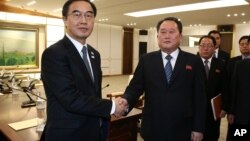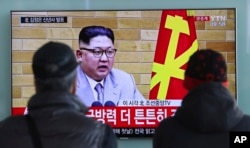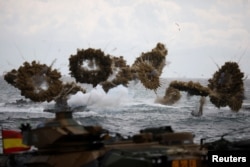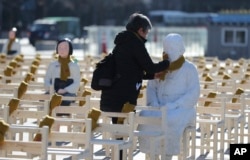South Korean President Moon Jae-in emphasized on Wednesday that the denuclearization of North Korea is the long-term goal of his efforts to engage with Pyongyang to participate in the upcoming Olympics, and to resume military talk.
"What we can do at the moment is improve inter-Korean relations, engage North Korea in dialogue, so that North Korea can return to the negotiation table for ultimately denuclearization," said Moon during South Korea’s annual presidential New Year’s press conference.
Inter-Korean talks
Agreements reached Tuesday during the first inter-Korean talks in two years, he said, are a positive first step that could create a pause in provocations and give momentum to diplomacy.
After high level delegations met for 11 hours, North and South Korea agreed to restore the emergency communication hotline between the two counties, and hold military talks to resolve disputes and avert accidental conflict, as tensions remain high over North Korea’s efforts to develop nuclear missiles capable of hitting the United States.
North Korea also agreed to send a large delegation to next month's Winter Olympics in South Korea. The Seoul government said it would also consider suspending some unilateral sanctions that could prevent the North’s participation in the Olympics. This could include allowing entry to North Korean officials blacklisted for their alleged involvement in the nuclear program and lifting travel restrictions on the state-owned Air Koryo.
Trump credit
Tuesday's meeting followed more than a year of accelerated North Korean missile tests, some of them over Japanese territory, and its sixth and most powerful nuclear test, which prompted a U.S.-led campaign to toughen U.N. sanctions.
Moon said U.S. President Donald Trump deserved "big credit" for helping facilitate the inter-Korean talks by increasing pressure through sanctions on the North Korean leadership.
The U.S. also agreed to postpone joint military exercises with South Korea until after the Olympics, to give Moon diplomatic space to operate. It is likely that North Korea will also not conduct any missile and nuclear provocations during the games.
Trump had been critical of the prospect of negotiating with the North Korean leadership that has broken past agreements to end its nuclear program in exchange for economic assistance and security guarantees. But this week Trump called the talks "a good thing" that came as a result of his "firm, strong" stance, and said the U.S. would get involved in the negotiations "at the appropriate time."
However President Moon conceded his approach to reduce tensions through dialogue and engagement differs from the U.S. led emphasis on pressuring the Kim Jong Un government with sanctions and the threat of military force.
South Korea, he said, wants to pursue denuclearization without risking a devastating war with North Korea that would put at risk millions of Koreans on both sides of the border.
"How can we de-escalate these issues and prevent a possible armed conflict, and while doing so bring North Korea to a dialogue? That is our current dilemma, and that requires a prudent approach," said Moon.
While the South Korean leader said his outreach to the North would not violate United Nations sanctions, critics say his engagement approach could reduce international pressure on the Kim government and weaken the U.S., South Korean military alliance.
Sex slavery
President Moon also tried to both criticize and support the 2015 "Comfort Women" agreement that "finally and irreversibly" resolved all grievances related to Japan's wartime sexual enslavement of Korean women.
Moon’s predecessor Park Geun-hye, who was impeached from office last year, approved the "comfort women" deal that included a carefully worded statement of apology by Japanese Prime Minister Shinzo Abe offering vague "apologies and remorse" for "immeasurable and painful experiences," and an $8 million dollar donation to a victims fund as a final legal and political settlement to this highly charged issue.
But the agreement has been unpopular in South Korea and was immediately criticized by some of the surviving "comfort women" who were among the 200,000 women in Asia who were forced to work as sex slaves for Japanese soldiers during the war.
After conducting a review of the agreement the Moon administration said it would not seek to renegotiate the deal with Japan, while at the same time calling on Tokyo to take further measures to address the grievances of the victims.
Seoul will also freeze the $8 million Tokyo donation to the Comfort Women and instead use South Korean government funds to help the survivors.
"By receiving funding from the Korean Government the victims will feel more comfortable using that money," he said.
Writing in the Asia Times, security analyst Grant Newsham, with the Forum for Strategic Studies in Tokyo, criticized President Moon for "trying to have it both ways; calling for 'future-oriented' cooperation with Japan, while savaging the Japanese over the comfort women."
Youmi Kim in Seoul contributed to this report







